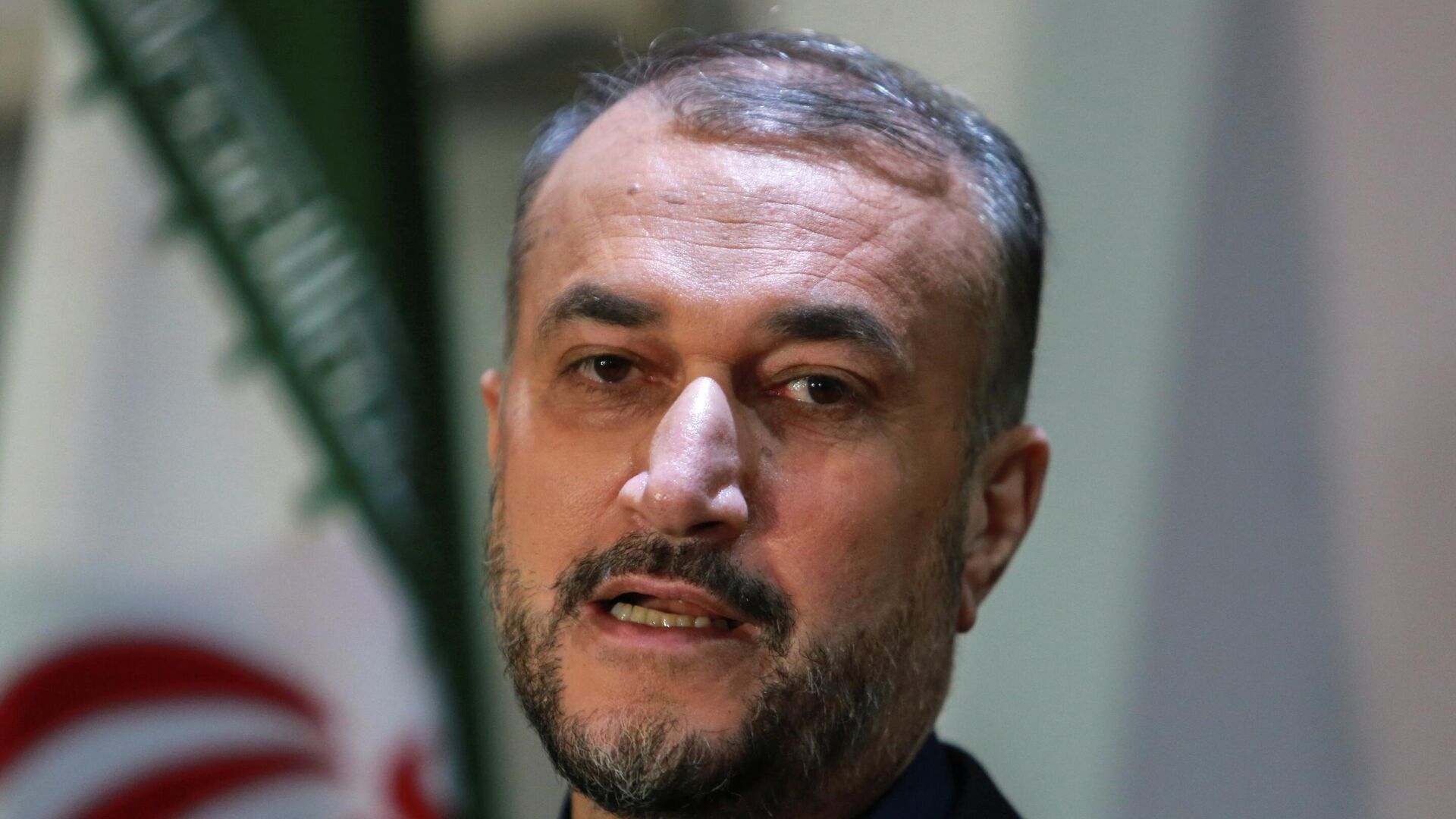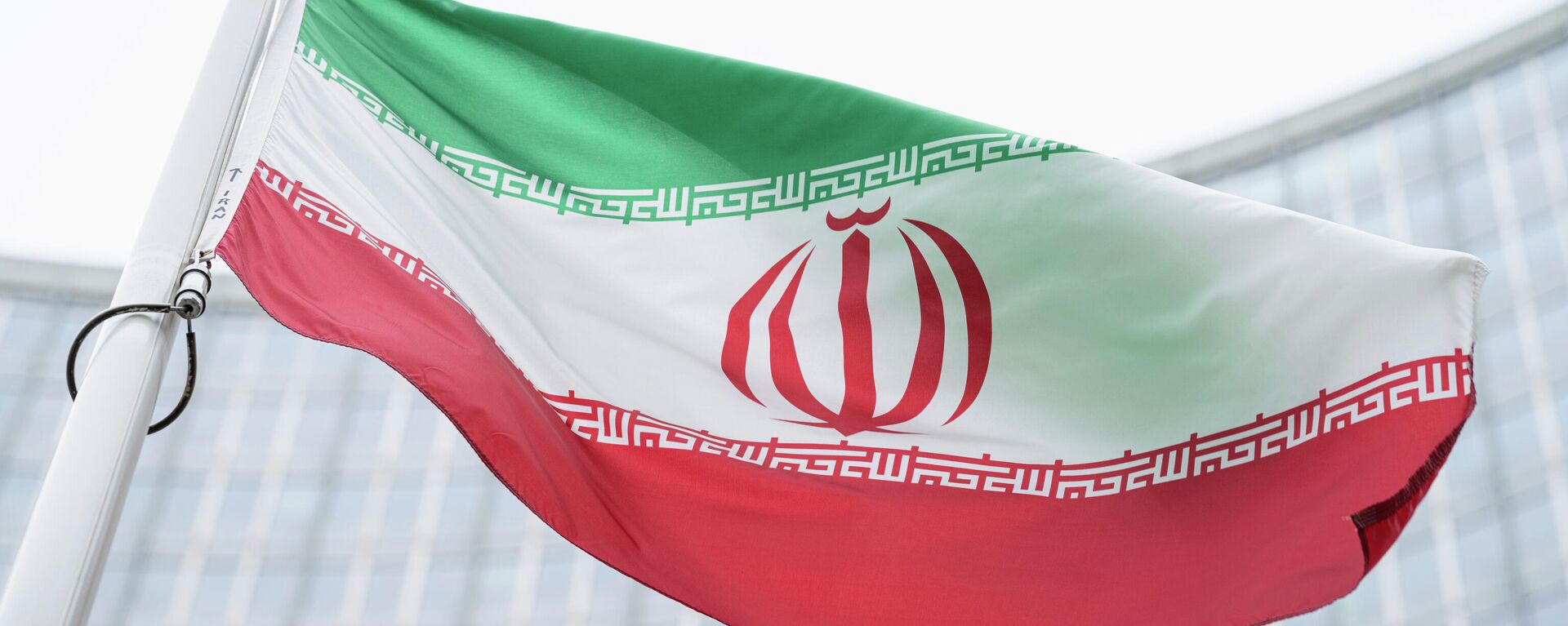https://sputnikglobe.com/20220411/iranian-fm-us-keeps-imposing-new-conditions-before-nuclear-talks-reach-conclusion-1094658641.html
Iranian FM: US Keeps 'Imposing New Conditions' Before Nuclear Talks Reach Conclusion
Iranian FM: US Keeps 'Imposing New Conditions' Before Nuclear Talks Reach Conclusion
Sputnik International
Iran has been in direct and indirect talks with France, Germany, the EU, Russia, and China in the Austrian capital for a year to resurrect the 2015 accord... 11.04.2022, Sputnik International
2022-04-11T03:53+0000
2022-04-11T03:53+0000
2023-07-31T16:59+0000
iran
us
us sanctions
sanctions
middle east
joint comprehensive plan of action (jcpoa)
iran deal
iran nuclear deal
https://cdn1.img.sputnikglobe.com/img/07e6/04/0b/1094658773_0:28:2874:1645_1920x0_80_0_0_dccfe330782a8933b47c5470f08ef466.jpg
Iran's foreign minister claimed on Sunday that the United States is "imposing new conditions" in the talks to re-establish the nuclear deal, the state IRNA news agency reported.According to the foreign minister, the US continues to talk "about the need for direct negotiations, but we have not seen the benefit of direct talks with the United States."Iran was provided sanctions relief in 2015 in exchange for restrictions on its nuclear program, ensuring that Tehran would not be able to produce nuclear weapons, which it has always denied wanting to do. However, following US President Donald Trump's unilateral withdrawal from the agreement in 2018 and the reimposition of harsh economic penalties, Iran began to backtrack on its own pledges.The goal of the Vienna talks is for the US to return to the nuclear deal, including through the lifting of sanctions against Iran, and for Tehran to fully comply with its obligations. Negotiations have been on hold since March 11 after Russia wanted assurances that sanctions imposed in response to its special military operation in Ukraine would not harm its trade with Iran and after the US reportedly seized two of the Iranian ships delivering the country's oil. Moscow announced a few days later that it had acquired the requisite assurances.The talks had moved most of the way toward restoring the accord, with several sides pointing to the "final phase," but there were still outstanding concerns.Tehran's demand that the Islamic Revolutionary Guard Corps, the elite branch of Iran's military, be removed from a US terror list is reported to be one of the major sticking issues.Earlier, the media reported that the whole impasse with almost concluded negotiations was likely caused by this single issue and the US' unwillingness to budge. On Friday, the State Department announced that the Biden administration decided not to remove the military branch from the list of terror organizations.Gen. Mark Milley, Chairman of the Joint Chiefs of Staff, said the same thing at a congressional hearing earlier this week.
https://sputnikglobe.com/20220403/iran-deals-impasse-caused-almost-solely-by-us-refusal-to-remove-irgc-from-terrorist-list---report-1094430657.html
iran
Sputnik International
feedback@sputniknews.com
+74956456601
MIA „Rossiya Segodnya“
2022
News
en_EN
Sputnik International
feedback@sputniknews.com
+74956456601
MIA „Rossiya Segodnya“
Sputnik International
feedback@sputniknews.com
+74956456601
MIA „Rossiya Segodnya“
iran, us, us sanctions, sanctions, middle east, joint comprehensive plan of action (jcpoa), iran deal, iran nuclear deal
iran, us, us sanctions, sanctions, middle east, joint comprehensive plan of action (jcpoa), iran deal, iran nuclear deal
Iranian FM: US Keeps 'Imposing New Conditions' Before Nuclear Talks Reach Conclusion
03:53 GMT 11.04.2022 (Updated: 16:59 GMT 31.07.2023) Kirill Kurevlev
Managing Editor
Iran has been in direct and indirect talks with France, Germany, the EU, Russia, and China in the Austrian capital for a year to resurrect the 2015 accord, formally known as the Joint Comprehensive Plan of Action (JCPOA). But in early March, the negotiations abruptly stalled before reaching the finish line.
Iran's foreign minister claimed on Sunday that the United States is "imposing new conditions" in the talks to re-establish the nuclear deal, the state IRNA news agency
reported."On the issue of lifting sanctions, they [the Americans] are interested in proposing and imposing new conditions outside the negotiations,” Hossein Amir-Abdollahian is quoted in the report as saying. "In the last two or three weeks, the American side has made excessive demands that contradict some paragraphs of the text."
According to the foreign minister, the US continues to talk "about the need for direct negotiations, but we have not seen the benefit of direct talks with the United States."
"We seek the lifting of sanctions, but with dignity and with a lasting agreement,” Amir-Abdollahian said, adding that “Iran has stood and will stand by its red lines.”
Iran was provided sanctions relief in 2015 in exchange for restrictions on its nuclear program, ensuring that Tehran would not be able to produce nuclear weapons, which it has always denied wanting to do. However, following US President Donald Trump's unilateral withdrawal from the agreement in 2018 and the reimposition of harsh economic penalties, Iran began to backtrack on its own pledges.
The goal of the Vienna talks is for the US to return to the nuclear deal, including through the lifting of sanctions against Iran, and for Tehran to fully comply with its obligations. Negotiations have been on hold since March 11 after Russia wanted assurances that sanctions imposed in response to its special military operation in Ukraine would not harm its trade with Iran and after the US reportedly seized two of the Iranian ships delivering the country's oil. Moscow announced a few days later that it had acquired the requisite assurances.
“During my visit to Moscow, we agreed with the Russian side that if we reached an agreement in Vienna, Russia would not be an obstacle,” Amir-Abdollahian said. "We were close to concluding technical discussions with the three European countries, but at the same time we faced the crisis and the war in Ukraine."
The talks had moved most of the way toward restoring the accord, with several sides pointing to the "final phase," but there were still outstanding concerns.
Tehran's demand that the Islamic Revolutionary Guard Corps, the elite branch of Iran's military, be removed from a US terror list is reported to be one of the major sticking issues.
Earlier, the media reported that the whole impasse with almost concluded negotiations was likely
caused by this single issue and the US' unwillingness to budge. On Friday, the State Department
announced that the Biden administration decided not to remove the military branch from the list of terror organizations.
Gen. Mark Milley, Chairman of the Joint Chiefs of Staff, said the same thing at a congressional hearing earlier this week.


